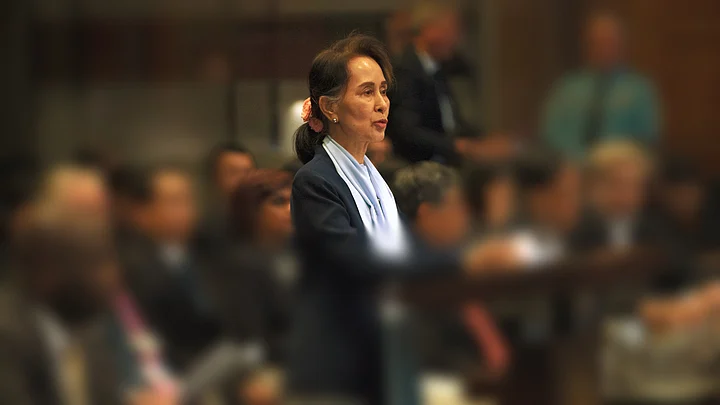The Myanmar military staged a coup in the early hours of this morning. It took this extreme step hours before a new parliament was to convene following national elections in November 2020. It has taken the country’s civilian leadership including Aung San Suu Kyi into custody. It has also declared a one-year state of emergency.
The National League of Democracy (NLD)—which was the party in power—had swept the election.
Political parties aligned to the military had performed worse than the army had expected. These parties alleged widespread election fraud. The army supported their claims.
In a statement which it issued yesterday the military stated that it was not objecting to the “outcome” of the election but its “process…with over 10.5 million cases of potential fraud, such as non-existent votes”. To buttress its claim the military pointed to its acceptance of the massive NLD electoral victory in the 2015 election.
Tussle Over November 2020 Election Results in Myanmar
The military’s rationale is hardly valid. The real reason for the coup lies in its fear that Aung San Suu Kyi, who the army has never fully trusted, would have been encouraged by the electoral victory to seek to curb its power in the political process.
Under the present constitution 25% of parliamentary seats are reserved for the military. Besides, the constitution also decrees that its nominees would be the ministers of defence, border areas and home affairs. Thus, it retained full control of the security apparatus of the state.
The coup came in the wake of increasing political tensions between the NLD and the military over the election results.
Western countries and even the United Nations Secretary General had very strongly urged the military to accept the election results.
It obviously disregarded these warnings. This is hardly surprising. Myanmar military has always considered itself not only the ultimate but the only guardian of the country. It has always believed that the country is under siege from enemies within and outside forces. It has the conviction that but for its resolve the unity of the country and the control of the main ethnic group—the Barmars—would unravel. It has a profound distrust of politicians. Hence, it would never entirely give up its political role.
Will World Now Understand Aung San Suu Kyi’s Compulsions?
This coup puts Myanmar’s social and political realities in sharp relief. Over the past five years Aung San Suu Kyi was severely criticised by western governments and liberal international opinion on the Rohingya issue. She was alleged to be shielding the military’s alleged genocide against the Rohingya group. Indeed, she lost her iconic status.
The question is, if the international critics of Suu Kyi would now realise the kind of compulsions she was operating under.
Or, would they consider that had she not pandered to the military it could have been better controlled? An objective assessment must lean towards the former assessment.
The fact is that Suu Kyi was navigating through the complexities of ethnic realities of Myanmar. She is the daughter of General Aung San, who is hailed as the founder of the Myanmar army but was murdered in July 1947. Aung San was a Barmar and is revered. However, there was also some disappointment that he had married a Karen lady—Suu Kyi’s mother.
The Barmar ethnic group strongly feels that it should dominate the country’s affairs. It inhabits, in large measure the central parts of the country while numerous other ethnic groups live in the border areas. The country has experienced ethnic insurgencies continuously since its independence in 1948. This has impacted on the insecurities of the Myanmar military which is principally manned by the Barmars.
Will China Court the ‘Pariah’ Myanmar Military?
The international reaction to the coup will be on predictable lines. Western countries would condemn it strongly and re-impose sanctions against the military. They will urge that the election results be respected and that the army steps back.
The ASEAN countries will be more circumspect for they do not really interfere in the domestic developments of their member-states. Besides, Thailand has experienced many coups and is today under a prime minister who had staged a coup and thereafter took to the political process. In any event, the Thai army is a factor in Thai politics.
The main question is how will China act. More than three decades ago the Myanmar army had junked an election result and western countries and India strongly condemned the move. On the other hand, China saw it as an opening and cemented its ties with the Myanmar military and ensured that the country kept afloat.
Despite some resentment in the Myanmar elite including the military at China’s pervasive and comprehensive influence—if not power—in the country, it is the most important external factor. If now the Myanmar military is made an international pariah again, it will have no alternative but to go further into the Chinese embrace.
Indian interests demand that while regret be shown for the step taken by the military a robust engagement continues with it and other sections of Myanmar opinion. A very heavy price was paid for the approach taken in 1988. That holds a lesson which should be taken into account to protect Indian interests. The field cannot be left to China.
(The writer is a former Secretary [West], Ministry of External Affairs. He tweets at @VivekKatju. This is an opinion piece, and the views expressed above are the author’s own. The Quint neither endorses nor is responsible for them.)
(At The Quint, we question everything. Play an active role in shaping our journalism by becoming a member today.)
